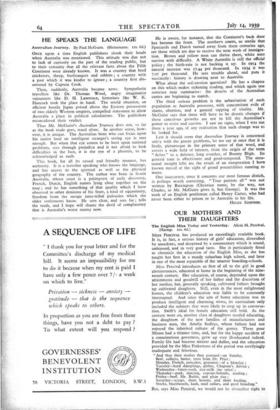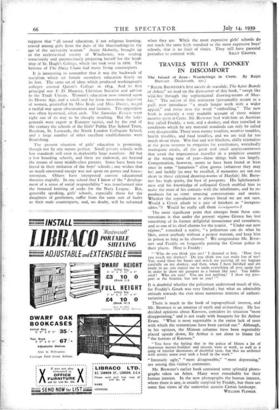OUR MOTHERS AND THEIR DAUGHTERS
The English Miss Today and Yesterday. Alicia M. Percival. (Harrap. los. 6d.)
MISS PERCIVAL has produced an exceedingly readable book. It is, in fact, a serious history of girls' education, diversified by anecdotes, and deepened by a commentary which is sound,
unbiassed, and in very good taste. She is particularly fitted to chronicle the education of the English Miss, as she has taught her first in a sturdy suburban high school, and later in one of the most reputable of the smarter boarding-schools.
Miss Percival introduces us first of all to the girl in good circumstances, educated at home in the beginning of the nine-
teenth century. Her education, of course, depended upon the attainments and goodwill of her father and the discretion of her mother, but, generally speaking, cultivated fathers brought up cultivated daughters. Still, even in the most enlightened homes, the children's education was liable to be constantly interrupted. And since the aim of home education was to produce intelligent and charming wives, its curriculum only
included the subjects that were likely to crop up in conversa- tion. Swift's ideal for female education still held. As the century wore on, another class of daughters needed educating, the daughters of the new families of manufacturers and business men, the Amelia Sedleys, whose fathers had not enjoyed the inherited culture of the gentry. These poor Misses had a thinner time, and, but for the happy accident of a conscientious governess, grew up very ill-educated indeed. Family life had become stricter and duller, and the education provided by the Miss Pinkertons of the period was terrifyingly inadequate and frivolous.
" And thus their studies they pursued—on Sunday, Beef, collects, batter, texts from Dr. Price ;
Monday, French, pancakes, grammar—of a Monday ; Tuesday—hard dumplings, globes, Chapone's Advice ; Wednesday—fancy-work, rice-milk (no spice) ; Thursday—pork, dancing, currant-bolsters, reading ; Friday—beef, Mr. Butler, and plain rice ;
Saturday—scraps, short lessons, and short feeding, Stocks, blackboards, hash, steel collars, and good breeding."
But, says Miss Percival, we would not be altogether right to
suppose that " all sound education, if not religious learning, ceased among girls from the days of the bluestockings to the age of the university woman." Annie Moberly, brought up in the ecclesiastical society of Winchester, was reading voraciously and unconsciously preparing herself for the head- ship of St. Hugh's College, which she took over in 1886. The heroine of The Daisy Chain had many living counterparts.
It is interesting to remember that it was the backwash of socialism which set female secondary education firmly on its feet. The same set of ideas which produced workingmen's colleges created Queen's College in 1854. And its first principal was F. D. Maurice, Christian Socialist and adviser to the Trade Unions. Women's education now entered upon its Heroic Age, and a small and far from monstrous regiment of women, generalled by Miss Beale and Miss Davies, waed a tactful war upon obscurantism and laziness. The opposition was often hysterical, often arch. The Saturday Review went right out of its way to be cheaply insulting. But the lady- generals were expert at Kutuzov tactics, and by the end of the century the schools of the Girls' Public Day School Trust, Roedean, St. Leonards, the North London Collegiate School, and a large number of other excellent establishments were flourishing.
The present situation of girls' education is promising, though not by any means perfect. Small private schools with low standards still exist in deplorably large numbers. All but a few boarding schools, and these are endowed, are beyond the means of most middle-class parents. Some have been too literal in their imitation of the boys' schools ; one wishes that so much emotional energy was not spent on games and house- totemism. Others have interpreted current educational theories stupidly. In one school that I know of the " develop- ment of a sense of social responsibility " was transformed into the frenzied knitting of socks for the Navy League. But, generally speaking, girls' schools, especially those for the daughters of gentlemen, suffer from the same sort of faults as their male counterparts, and, no doubt, will be reformed when they are. While the most expensive girls' schools do not reach the same high standard as the most expensive boys' schools, that is no fault of theirs. They still have parental











































 Previous page
Previous page